|
|
|
Sort Order |
|
|
|
Items / Page
|
|
|
|
|
|
|
| Srl | Item |
| 1 |
ID:
099293
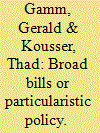

|
|
|
|
|
| Publication |
2010.
|
| Summary/Abstract |
When do lawmakers craft broad policies, and when do they focus on narrow legislation tailored to a local interest? We investigate this question by exploring historical variation in the types of bills produced by American state legislatures. Drawing on a new database of 165,000 bills-covering sessions over 120 years in thirteen different states-we demonstrate the surprising prominence of particularistic bills affecting a specific legislator's district. We then develop and test a theory linking the goals of legislators to their propensity to introduce district bills rather than broad legislation. We find that, consistent with our predictions, politicians are more likely to craft policies targeted to a particular local interest when a legislature is dominated by one party or when it pays its members relatively high salaries. These findings provide empirical support for Key's (1949) thesis that one-party politics descends into factionalism and undermines the making of broad public policy.
|
|
|
|
|
|
|
|
|
|
|
|
|
|
|
|
| 2 |
ID:
102561
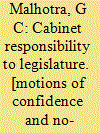

|
|
|
|
|
| Edition |
2nd ed
|
| Publication |
New Delhi, Lok Sabha Secretariat, 2004.
|
| Description |
xxxi, 1009p.
|
| Standard Number |
8120004000
|
|
|
|
|
|
|
|
|
|
|
|
Copies: C:1/I:0,R:1,Q:0
Circulation
| Accession# | Call# | Current Location | Status | Policy | Location |
| 055665 | 328.5405/MAL 055665 | Main | On Shelf | Reference books | |
|
|
|
|
| 3 |
ID:
086386
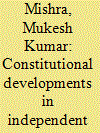

|
|
|
|
|
| Publication |
2008.
|
| Summary/Abstract |
The first constitution of the independent and sovereign Republic of Kazakhstan was adopted in January 1993. Amidst heated debate in the Supreme Soviet building and heckling by a crowd of protesters outside, the Kazakh Parliament retified the country's first post-Soviet constitution in January 1993.
|
|
|
|
|
|
|
|
|
|
|
|
|
|
|
|
| 4 |
ID:
132348
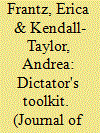

|
|
|
|
|
| Publication |
2014.
|
| Summary/Abstract |
A dictator's motivation for using repression is fairly clear, but why some repress more than others or favor particular types of repressive strategies is less obvious. Using statistical analysis, this article demonstrates that a dictator's reliance on co-optation fundamentally alters how repression is used. Specifically, it finds that co-optation through the use of political parties and a legislature creates incentives that lead dictators to decrease empowerment rights restrictions, like censorship, while increasing physical integrity rights violations, like torture and political imprisonment. This occurs because, by creating parties and a legislature, a dictator draws his potential opposition out of the general public and into state institutions, making it easier to identify who these opponents are, to monitor their activities, and to gauge the extent of their popular support. This reduces the need to impose broad types of repressive measures, like empowerment rights restrictions, that breed discontent within the overall population. At the same time, co-optation creates the risk that rivals, once co-opted, will use their positions within the system to build their own bases of support from which to seek the dictator's overthrow, generating incentives for dictators to increase physical integrity violations to limit the threat posed by these individuals.
|
|
|
|
|
|
|
|
|
|
|
|
|
|
|
|
| 5 |
ID:
096689
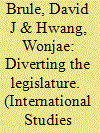

|
|
|
|
|
| Publication |
2010.
|
| Summary/Abstract |
Given distinct partisan macroeconomic preferences, the partisanship of the president or majority in Congress should influence presidential decisions to use force in the face of poor economic conditions-the diversionary use of force. But previous research posits contradictory accounts of the influence of partisanship. We seek to resolve this debate by developing a game theory model, which predicts that leaders divert when government is divided and economic conditions hurt the opposition party's constituency. Leaders seek to divert the legislature from the economy in order to prevent the legislature from passing a remedial economic bill. Analyzing US conflict behavior since World War II, we examine the conditional influence of presidential partisanship and the president's cohesive partisan support in Congress on the effects of inflation and unemployment. Consistent with the model's predictions, we find that as their cohesive partisan support in Congress declines, Democratic presidents tend to use force in response to inflation and Republican presidents tend to use force in response to unemployment.
|
|
|
|
|
|
|
|
|
|
|
|
|
|
|
|
| 6 |
ID:
189046
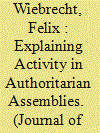

|
|
|
|
|
| Summary/Abstract |
Who attempts to influence policymaking through authoritarian assemblies and why are some delegates considerably more active in doing so than others? Drawing on original data from provincial People's Political Consultative Conferences (PPCCs) in China, this study adopts a delegate-centered perspective and develops a theory of delegates’ activity in authoritarian assemblies. It argues that delegates’ activity can be explained by a combination of both cooptation theory and an understanding of delegates’ position within the authoritarian regime and hierarchy. The results highlight that core elites with more direct means of influencing policymaking will forego assemblies. Yet, peripheral elites lack other institutional channels of access to decision-makers and have to voice their demands in authoritarian legislatures. This study highlights the need for disaggregating groups of actors in authoritarian politics and offers an alternative view of cooptation particularly relevant for closed authoritarian regimes.
|
|
|
|
|
|
|
|
|
|
|
|
|
|
|
|
| 7 |
ID:
181834
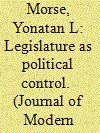

|
|
|
|
|
| Summary/Abstract |
A growing literature has begun to more closely examine African legislatures. However, most of this research has been attentive to emerging democratic settings, and particularly the experiences of a select number of English-speaking countries. By contrast, Cameroon is a Francophone majority country that reintroduced multiparty politics in the early 1990s but continues to exhibit significant authoritarian tendencies. This article provides a longitudinal analysis of Cameroon's National Assembly and builds on a unique biographical dataset of over 900 members of parliament between 1973 and 2019. The article describes changes in the structure and orientation of the legislature as well as the social profile of its members, in particular following the transition to multipartyism. While the legislature in Cameroon remains primarily a tool of political control, it is more dynamic, and the mechanisms used to manage elites within the context of complex multiethnic politics have evolved.
|
|
|
|
|
|
|
|
|
|
|
|
|
|
|
|
| 8 |
ID:
146499
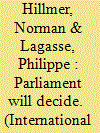

|
|
|
|
|
| Summary/Abstract |
Debates about Parliament’s role in deciding military deployments are clouded by misunderstandings of the relative legal authorities of the executive and the legislature, and the mixture of political objectives and democratic obligation that inform these discussions. Much has been written about the legal aspects of this question. This article considers instead the issues of politics and principle, which we argue are consistently interwoven: while governments have elevated Parliament’s role in military deployments for political purposes, the choice to involve the legislature also reflects the idea that it is the “right thing to do” in a democracy.
|
|
|
|
|
|
|
|
|
|
|
|
|
|
|
|
| 9 |
ID:
148548
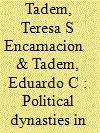

|
|
|
|
|
| Summary/Abstract |
The results of the 2013 Philippine mid-term elections highlighted the dominance of political dynasties in the country. With all 80 provinces littered with political families, 74 percent of the elected members of the House of Representatives came from such dynastic groups. Despite overwhelming recognition that political dynasties breed patronage politics and corruption, no substantial steps have been undertaken to address this issue. This article examines the general nature of Philippine political dynasties, the reasons for their continuing existence and their adverse impact on the country. This problem emanates basically from three factors: (1) the political and socio-economic foundations upon which political dynasties are built; 2) the inability to effectively implement Philippine constitutional provisions by enacting an enabling law; and 3) the weakness of potential countervailing forces that would challenge political dynasties.
|
|
|
|
|
|
|
|
|
|
|
|
|
|
|
|
| 10 |
ID:
118640
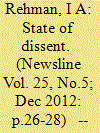

|
|
|
| 11 |
ID:
164404
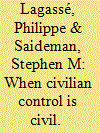

|
|
|
|
|
| Summary/Abstract |
This study introduces a new type of oversight in civil-military and executive-legislative relations: community policing. Building on principal-agent theory, this type of oversight emphasises trust rather than confrontation. To illustrate how community policing functions, the study examines how legislative oversight of military affairs operates in Belgium and New Zealand. Legislative defence committees in both countries rely on trust when overseeing the executive’s handling of defence affairs. This allows these committees to perform their oversight function at low cost in terms of time and effort, but with a high degree of access to information. Community policing therefore combines the strengths of recognised ‘police patrol’ and ‘fire alarm’ oversight, while avoiding their respective weaknesses. However, since it relies on a higher degree of trust and cooperation between the principal and agent, community policing is inherently fragile.
|
|
|
|
|
|
|
|
|
|
|
|
|
|
|
|
|
|
|
|
|